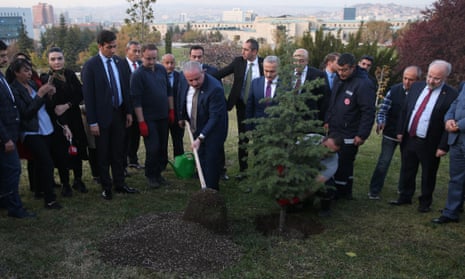Up to 90% of the millions of saplings planted in Turkey as part of a record-breaking mass planting project may have died after just a few months, according to the country’s agriculture and forestry trade union.
On 11 November last year, which the government declared National Forestation Day, 11 million trees were planted by volunteers in more than 2,000 sites across the country, including by the Turkish president, Recep Tayyip Erdoğan, and the parliament Speaker, Mustafa Şentop.
The government-backed programme broke the world record for the most trees planted in one hour in a single location, with 303,150 saplings planted in the northern Anatolian city of Çorum.
The head of the union claimed, however, that 90% of the saplings his teams have inspected so far have died because of insufficient water. Speaking to the Guardian, Şükrü Durmuş attributed the deaths to the saplings being planted at “the wrong time” and “not by experts”, as well as a lack of rainfall.
Durmuş said the union has carried out research in six of Turkey’s 81 provinces, and further investigations are planned.
The ministry of agriculture and forestry denied the claim and said that “as of today, 95% of the more than 11 million saplings planted are healthy and continuing to grow”.
The union cast doubt on the government’s claims. “Even with normal time and preparation, the success rate is between 65 and 70%,” said Durmuş. “The 95% rate given by the ministry is never true.”
Q&AHow do you make reforestation work?
Show
The disastrous Turkish episode has highlighted a growing debate among conservationists and scientists over the best way to pursue reforestation.
While there is little dispute that reforestation is a highly effective way to mitigate global heating via carbon sequestration by trees, there is disagreement over the most practical and cost-effective way of doing it.
While showy mass plantings – like the Turkish effort – grab the international headlines, an increasing body of evidence suggests projects that help natural regeneration through land use policies may be cheaper and more effective.
A report published last year by Conservation International – Giving Nature a Hand – suggests that meeting ambitious global targets for reforestation and carbon sequestration through replanting – or “active restoration” - would be “prohibitively expensive”.
“For example, the ambitious Bonn challenge commitment to restore up to 350m hectares of global degraded and deforested lands by 2030 could potentially cost between US$4.9tn and $12tn,” the report argues, “if active restoration is the only restoration strategy implemented.
“In contrast, as one example of an assisted natural regeneration strategy, excluding cattle from pasture land with an inexpensive barbed wire fence may be all that is required to facilitate natural regeneration of forests.”
The report cites recent research in Brazil’s Atlantic Forest, a 130m-hectare biome that is one of the world’s most threatened biodiversity hotspots. After widespread deforestation over centuries only 26.4% of the original forest cover remains.
It continues: “Between 1996 and 2015, at least 2.7m hectares are estimated to have regenerated naturally, mainly due to land abandonment and restrictions on deforestation … [an] area equivalent to 8% of the existing remnant forest area."
“At the global scale,” it adds, “tree coverage (ie new forests) could take place in 0.9bn hectares – almost the size of the United States – yet the potential for assisted natural regeneration of forests remains to be fully studied.” Peter Beaumont
The dispute adds to the global debate about mass tree-planting, with critics pointing out the sometimes poor survival rate of mass-planted saplings, and the use of such projects to “greenwash” states and companies with otherwise poor environmental records.
Both trees and the wider environment have emerged as particularly prominent in Turkish politics over the past few years, most notably during the months-long protests sparked by the government plan to redevelop Istanbul’s Gezi Park.
Erdoğan has declared that National Reforestation Day will be repeated every 11 November.
The ruling AK party claims it has planted more than 4.5bn saplings in its 17 years in power. However, its environmental policies continue to attract criticism, most recently over the razing of forests to build Istanbul’s new airport, and over plans to create a 45km (28-mile) canal to divert shipping traffic from the Bosphorus.
